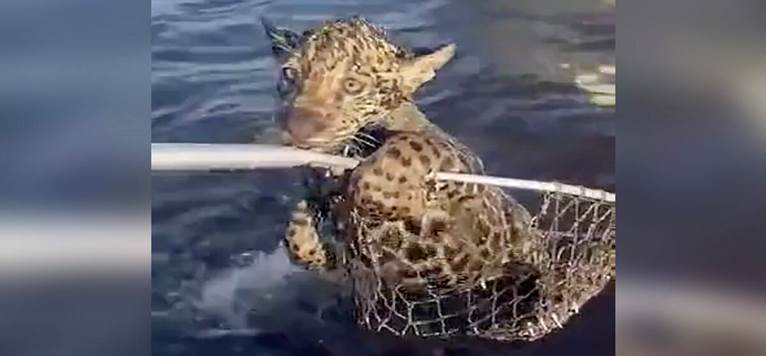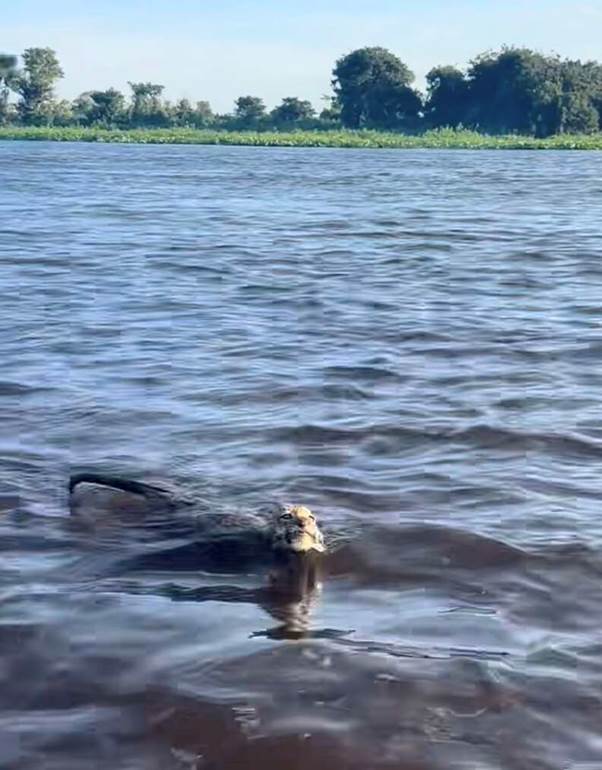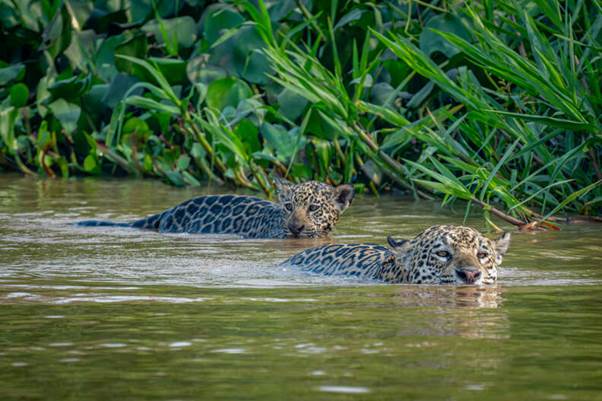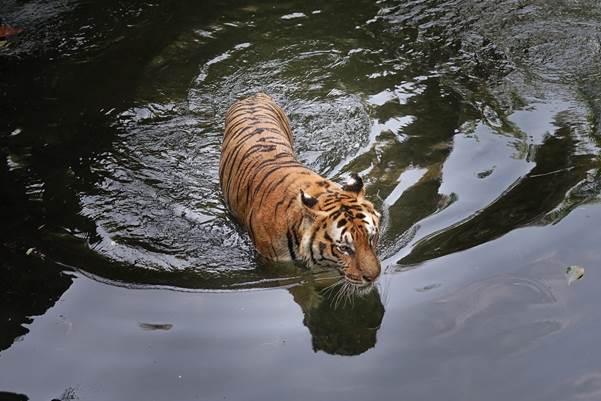
Earlier this month, Vanderlei Rabi and a few friends set out for what they thought would be a routine fishing trip along the rivers of Brazil’s Pantanal wetlands — one of the richest ecosystems in the world. Known for its breathtaking scenery and abundant wildlife, the Pantanal often provides glimpses of capybaras, caimans, and countless birds along its banks.
But what began as a calm day of fishing quickly turned into a life-saving mission that none of them would ever forget.
As the group steered their boat back toward shore, Rabi spotted a figure moving in the water ahead of them. At first glance, he assumed it was a capybara, one of the area’s most common river-dwellers.
“I asked the one steering the boat to take us there to see,” Rabi told The Dodo. “When we got there, we realized it wasn’t a capybara.”
Instead, to their surprise, it was something much rarer — a tiny jaguar cub, paddling frantically and struggling to stay afloat.

A Cub In Desperate Need
The sight immediately concerned Rabi and his companions. Jaguars are strong swimmers, and while cubs often follow their mothers across rivers, this one appeared exhausted and disoriented.
Looking ahead, Rabi spotted a female jaguar climbing out of the water onto the distant bank, leading two other cubs. It became clear that this youngster had fallen behind during the crossing.
Afraid the cub might not survive without help, the fishermen decided they couldn’t just stand by.
With quick thinking, they lowered one of their fishing nets into the water and carefully scooped the cub to safety. The little jaguar clung tightly to the net, too tired to resist, as the men gently lifted him aboard.

A Safe Return To Shore
Once the cub was secured, the fishermen quickly turned the boat toward the nearest bank. Their goal was not to interfere with the jaguar family but to reunite the cub with his waiting mother.
When they reached land, the men lowered the net, allowing the cub to crawl onto solid ground. But even then, the frightened youngster refused to let go of the net, his tiny claws gripping it tightly as though it was a lifeline.
Understanding that lingering too close could frighten the mother away, Rabi and his friends retreated immediately, leaving the cub in peace. They hoped their intervention gave him the strength and chance he needed to rejoin his family.
“To have been able to help was a sensational feeling,” Rabi said, reflecting on the unforgettable encounter.
Experts Praise Their Quick Thinking
News of the rescue quickly spread, and wildlife experts weighed in. Biologist Henrique Abrahão Charles applauded the fishermen’s decision to intervene, noting that while jaguar cubs are naturally capable swimmers, this one clearly needed help.
“The cub calls the mother — he knows,” Charles explained to G1 Globo News. “The mother does not abandon the cub. They communicate. The jaguar has a very powerful sense of smell, good hearing, and excellent vision. There are methods of vocalization for the cub. She will look for him, he will call for her.”
Charles added that by returning the cub close to where his mother had last been seen, the fishermen maximized the chances of a quick reunion.

A Story Of Compassion And Respect For Nature
Though the outcome of the reunion wasn’t directly observed, experts are confident that the mother would have quickly located her lost cub. Jaguars are highly attentive to their young, and mothers rarely abandon them.
The rescue serves as a powerful reminder of the importance of human compassion and careful action in moments of crisis. Instead of treating the animal as a curiosity or potential threat, Rabi and his companions acted with respect, ensuring they gave the cub the best chance at survival without unnecessary interference.
For Rabi, what began as a fishing trip turned into a life-changing experience. He and his friends set out hoping for a good catch — but what they pulled from the river that day was far more meaningful.
They had given a vulnerable jaguar cub a fighting chance to live, and in doing so, they had written themselves into the story of the Pantanal’s wild beauty.

